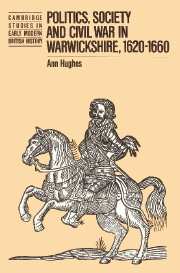Book contents
- Frontmatter
- Contents
- List of maps and plan
- List of tables
- Preface
- Acknowledgements
- Abbreviations and notes
- 1 The social context
- 2 Peers and gentlemen before the Civil War
- 3 Public affairs 1620–1639
- 4 The coming of the Civil War 1639–1642
- 5 Military rule 1642–1649
- 6 Militancy and localism in Warwickshire politics 1643–1649
- 7 The impact of the Civil War
- 8 Politics and religion 1649–1662
- Appendix 1 Local governors 1620–1660
- Appendix 2 Active county committeemen 1643–1647
- Bibliography of manuscript and printed sources
- Index
8 - Politics and religion 1649–1662
Published online by Cambridge University Press: 18 December 2009
- Frontmatter
- Contents
- List of maps and plan
- List of tables
- Preface
- Acknowledgements
- Abbreviations and notes
- 1 The social context
- 2 Peers and gentlemen before the Civil War
- 3 Public affairs 1620–1639
- 4 The coming of the Civil War 1639–1642
- 5 Military rule 1642–1649
- 6 Militancy and localism in Warwickshire politics 1643–1649
- 7 The impact of the Civil War
- 8 Politics and religion 1649–1662
- Appendix 1 Local governors 1620–1660
- Appendix 2 Active county committeemen 1643–1647
- Bibliography of manuscript and printed sources
- Index
Summary
A study of the political developments of the 1650s raises problems similar to those met with in the 1630s. For both decades the denouement of the story has threatened to distort the earlier narrative: in the light of the Restoration it is easy to overestimate the provincial hostility to the political experiments of the 1650s. For both decades, too, the sources are limited and elusive; for the 1650s a complete analysis is not possible and a detailed narrative would be banal. Insights into the political atmosphere have to be gleaned from particular episodes or from the careers of the politically active. The changing views of three broad groups can be most easily discerned. In the first place, there were a range of men prepared to participate in the administrative and political structures of 1650s regimes; these included enthusiasts of varying opinions but also more moderate or passively acquiescent figures. A much smaller group, in Warwickshire at least, involved the most zealous or ‘extreme’ Parliamentarians who sought further political and religious reform. Finally there are those, whether ex-royalists or ex-moderate Parliamentarians who were sullenly hostile or opposed to a non-monarchist England. In the main it is the views of social and political élites that are most easily discerned. In this period, however, political élites include the socially obscure military and official figures who had risen during the war while members of the prewar élite had to make a painful adjustment to new political realities.There is also evidence, indicated in the last chapter, that sharpened political tensions and divisions affected and involved a broad range of provincial society.
- Type
- Chapter
- Information
- Politics, Society and Civil War in Warwickshire, 1620–1660 , pp. 291 - 343Publisher: Cambridge University PressPrint publication year: 1987



